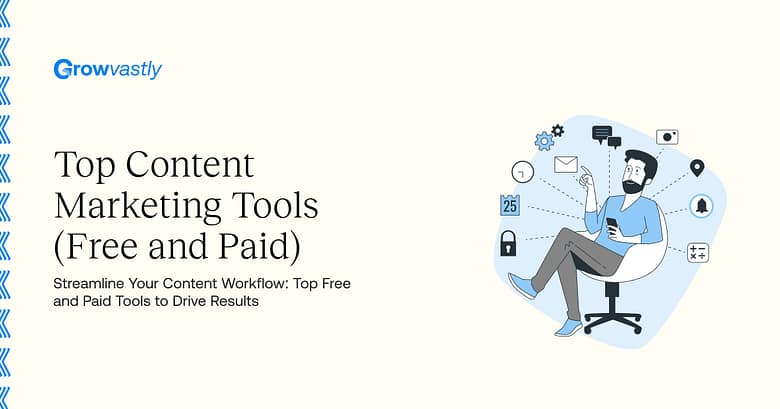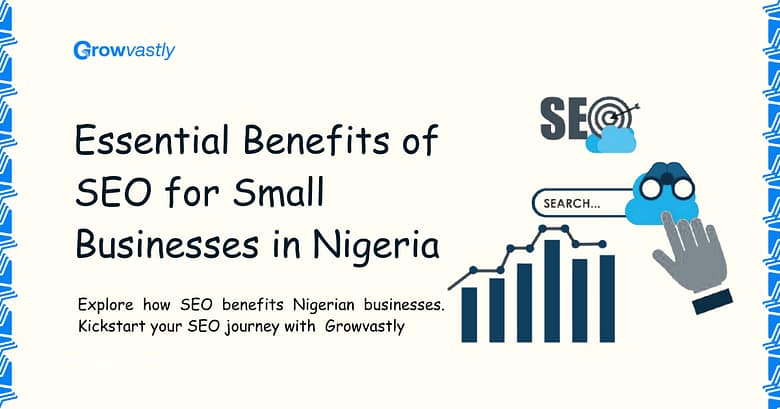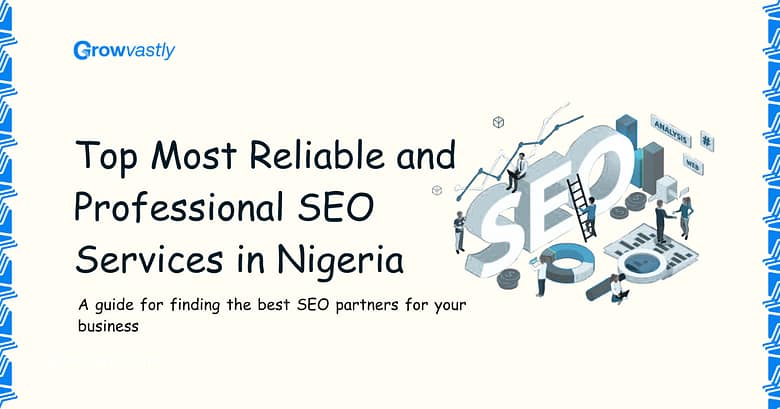Creating great content is one thing—getting it seen is another. Many business owners know content is key to growth, but the real struggle is usually marketing it effectively. With countless content marketing tools out there, figuring out what works can feel overwhelming.
Fortunately, you don’t have to figure it out alone. Whether you’re a marketer, content creator, or business owner, this guide will walk you through the best tools to simplify your content strategy, boost visibility, and drive real results.
What Are Content Marketing Tools?
Content marketing tools are apps or software that help marketers create, share, and track content. These tools cover everything from content creation (like writing and design) to sharing it (via social media or email) and checking its performance (like tracking views and engagement).
Key Roles of Content Marketing Tools
- Content Creation: These tools help produce quality content like blog posts, videos, graphics, and social media updates.
- Content Distribution: They make it easy to share content across different platforms and reach the right audience at the right time.
- Content Analytics: They help track how your content performs and see what works and doesn’t.
Technological Advancements That Have Made These Tools Indispensable
- AI and Machine Learning: These tools can write content, suggest edits, and boost SEO, saving time and improving quality.
- Automation: Tasks like scheduling posts and sending emails are now automated, so marketers can focus on strategy.
- Data Insights: With real-time data insights, you can track user actions, measure results, and adjust campaigns quickly.
- Cloud Access: Marketers can work from anywhere, share files easily, and store content securely thanks to the cloud.
Top 6 Paid Content Marketing Tools for 2025
1. HubSpot Content Management System (CMS)

Overview:
Hubspot is a cloud-based platform for creating and managing website content. With Hubspot, businesses can automate marketing campaigns, manage leads, track customer interactions, audit websites, and analyze performance data in one platform.
Top Features:
- Drag-and-drop editor
- Personalized content
- Built-in SEO tools
- Analytics
- Secure (SSL, firewall)
- Integrates with HubSpot CRM
Pricing:
- Free: Basic features like drag-and-drop and templates
- Paid: Starts at $15/month (Starter Marketing Hub), $800/month (Professional, Additional seats start at $45/month), $3,600/month (Enterprise, Additional seats start at $75/month)
Pros:
- Easy to use
- Works well with other HubSpot tools
- Strong SEO and analytics
- Good security
Cons:
- Limited free plan
- Expensive advanced plans
- It can be confusing for beginners
2. SEMrush

Overview:
Semrush is an all-in-one digital marketing platform that provides tools for SEO, PPC, content marketing, social media management, and research. It enables users to conduct keyword research, track website rankings, and perform audits for content improvement.
Top Features:
- Keyword research
- Site audit
- Backlink analysis
- Traffic and position tracking
- Content toolkit
Pricing:
- Free: Limited to 10 searches/day
- Paid: Starts at $139.95/month (Pro), $249.95/month(Guru), $499.95/month (Business).
Pros:
- All-in-one SEO tool
- Great for competitor research
- Easy to use
Cons:
- Pricey for small businesses
- The free version is limited
- Can be complex
3. CoSchedule

Overview:
CoSchedule is a marketing project management platform designed to help teams plan, organize, and execute content marketing campaigns effectively. It can handle multiple tasks at a time.
Top Features:
- Marketing calendar
- Content Organizer
- Social media scheduler
- Automation tools
- Team collaboration
Pricing:
- Free: Basic planning tools
- Paid: Starts at $19/month for social calendar and $59/month for agency calendar.
Pros:
- Simple interface
- Good for teams
- Great planning features
Cons:
- Limited free features
- It may be costly for small teams
- Fewer integration options
4. BuzzSumo

Overview:
BuzzSumo is a great tool for content research and finding trends online. Moreover, this tool helps marketers and content creators analyze content engagement and identify opportunities for outreach and content improvement.
Top Features:
- Find popular content
- Content Analysis
- Monitoring and Alerts
- Question Analyzer
- Discover influencers
Pricing:
- Free: 3 searches/day
- Paid: Starts at $199/month (content creation), $299/month (PR and Comms), $499/month (Suite), $999/month (Enterprise).
Pros:
- Great for trend spotting
- Strong research tools
- Easy to use
Cons:
- Costly for small teams
- The free version is limited
- Fewer features in lower plans
5. Hootsuite

Overview:
Hootsuite is a popular tool that helps business owners manage and schedule social media posts across platforms. Many marketers use this tool because it helps them build successful social media campaigns in less time.
Top Features:
- Post scheduler and Content Creation
- Analytics and Reports
- Social listening
- Team collaboration
Pricing:
- Free: 1 user, 3 social profiles
- Paid: Starts at $99/month (standard), $249/month (Advanced), and a custom plan (Enterprise)
Pros:
- Simple dashboard
- Supports many social platforms
- Helpful analytics
Cons:
- Very limited free plan
- Price grows with team size
- Some report slow support
6. Ahrefs

Overview:
Ahrefs is a comprehensive SEO tool that helps you analyze your website’s performance, understand your competitors, find keywords, and get backlinks to grow organic traffic.
Top Features:
- Keyword and backlink analysis
- Site audit
- Content and competitor research
- Rank tracking
Pricing:
- Free: Limited features
- Paid: Starts at $99/month
Pros:
- Excellent for SEO
- Strong data and reports
- Easy to navigate
- Has some free tools with limited features
Cons:
- No free trial
- Expensive
- It can feel advanced for beginners
Top 5 Free Content Marketing Tools for 2025
1. Google Analytics

Google Analytics is a free business tool to track and report website traffic, user behavior, user demographics, and more. It helps you understand what content performs best, the audience source, and how to optimize your strategy for better results.
Key Features
- Real-time data tracking
- Audience insights (location, behaviour, demographics)
- Traffic source breakdown
- Conversion tracking
2. Canva

Canva is a graphic design tool for creating visuals for social media, blogs, and websites. It makes designing high-quality visuals quick and easy, even without design experience.
Key Features
- Drag-and-drop design interface
- Thousands of free templates
- Stock photos and icons
- Team collaboration tools
- Paid version includes brand kits, premium assets, and more customization features
3. Trello

Trello is a collaboration content marketing tool that helps teams organize projects using boards and cards. It helps to keep content planning organized, making it easier to manage editorial calendars and collaborate with teams.
Key Features
- Customizable boards and lists
- Task assignment and due dates
- File attachments and checklists
- Integration with tools like Slack and Google Drive
4. AnswerThePublic

AnswerThePublic is a keyword research tool that provides insights into what people are searching for online. It helps you discover content ideas based on what your audience is actively searching for, improving SEO and engagement.
Key Features
- Visual keyword maps
- Long-tail keyword suggestions
- Search data based on real-time queries
5. HubSpot CRM (Free Version)

HubSpot CRM is a free customer relationship management tool for tracking and managing contacts. It helps you track leads, personalize content, and measure the impact of your campaigns, all from one dashboard.
Key Features
- Contact and lead management
- Email tracking and templates
- Dashboard and reporting
- Integration with marketing tools
Key Features to Look for in a Content Marketing Tool in 2025
- Relevance: The tool should align with your marketing goals, from SEO to content creation or social media.
- Scope of Data: Choose tools that provide deep insights into your audience, trends, and content performance.
- Pricing: Look for tools that fit your budget. Free tools are great for starters, while paid ones often offer more advanced features.
- Automation Features: Automation saves time. Features like content scheduling, email workflows, or auto-responses are a big plus.
- Analytics and Reporting: A good tool should give clear reports on what’s working and what needs improvement.
- Integration with Other Marketing Software: The best tools connect easily with others like CRMs, email platforms, or social media schedulers.
- User Interface and Ease of Use: It should be simple to navigate. A clean, easy-to-use dashboard makes your work faster and smoother.
- Scalability for Businesses of Different Sizes: Whether you’re a solo creator or a big team, the tool should have the ability to grow with your business.
How Content Marketing Tools Benefit Businesses
Tech companies often need to explain their complex products and services through marketing. Content marketing tools help simplify the technical information, making it easier to create blog posts, product guides, and tutorials that their audience can understand.
The advent of content marketing tools, such as Hubspot, SEMrush, and CoSchedule, has made content automation, publishing, and performance tracking much easier. And with these, tech businesses can build trust, educate users, and support their overall marketing goals.
Tips for Choosing the Right Content Marketing Tool for Your Business
- Set a budget to know how much you can spend without going bankrupt.
- Identify your basic and advanced marketing needs. This will help you know the features to prioritize in each app.
- Check the learning curve and choose tools your team can easily adapt to.
- Think long-term and look out for scalability and tool integrations that will fit with future trends.
- Analyze costs vs. benefits to ensure the value aligns with your goals.
Common Mistakes to Avoid When Choosing Content Marketing Tools
Selecting the wrong content marketing tools can hinder your marketing efforts. Here are common pitfalls to avoid:
- Avoid using tools that lack seamless integration. When your tools can’t communicate effectively, your workflow can become fragmented and inefficient. Always evaluate integration capabilities before making a choice.
- Don’t overlook scalability. A tool that works now might not meet your needs later. Choose options that can grow with your business.
- Quit focusing on the wrong features. Don’t get distracted by flashy features. Prioritize tools that support your core marketing goals.
- Never neglect user experience because complicated interfaces waste time. Ease of use matters, especially for teams and collaboration.
- Good tools come with great support. Look out for resources, tutorials, and responsive customer service.
Frequently Asked Questions
1. What are the best content marketing tools for small businesses in 2025?
Top tools include Canva for content creation, Buffer and Later for social media management, Google Analytics for tracking performance, and Mailchimp for email marketing. These tools offer affordable, easy-to-use features to help small businesses grow online.
2. How can content marketing tools improve SEO?
Tools like SEMrush, Ahrefs, and Surfer SEO help identify keywords, analyze competitors, and optimize content. They also track rankings and backlinks, improving search engine visibility and organic traffic.
3. Are free content marketing tools as effective as paid ones?
Free tools like Google Trends, Ubersuggest, and Grammarly are useful, especially for beginners. Paid tools offer more advanced features, better automation, and deeper analytics for scaling strategies.
4. How does technology help content marketing for tech companies?
Tech tools like HubSpot, Contentful, and Notion streamline content creation, distribution, and tracking, helping tech companies manage workflows and engage users across platforms.
5. What is the best content marketing software for automation?
HubSpot, CoSchedule, and Marketo excel in automation. They handle tasks like email sequences, social media scheduling, and performance tracking, saving time and boosting efficiency.
6. How do content marketing tools help with audience segmentation?
Tools like Mailchimp, ActiveCampaign, and Segment let marketers group audiences by behavior, demographics, and interests, enabling more personalized content and improving engagement and conversions.
7. How do content marketing tools improve collaboration among teams?
Tools like Trello, Airtable, and ClickUp provide shared workspaces, task assignments, timelines, and content calendars, helping teams stay aligned and ensuring smooth content production.
Final Thoughts
There you have it! Software content marketing tools you need in 2025 to take your business from zero to hero. With these tools, you can effectively create, manage, and optimize your content with ease, driving better results.
Scale Smarter With SEO That Understands Your Business
Our content-first, data-driven SEO approach is built for brands that want growth without the guesswork. If you’re ready to stop experimenting and start executing — we’ll take it from here.
Scale with Data-Driven SEO




